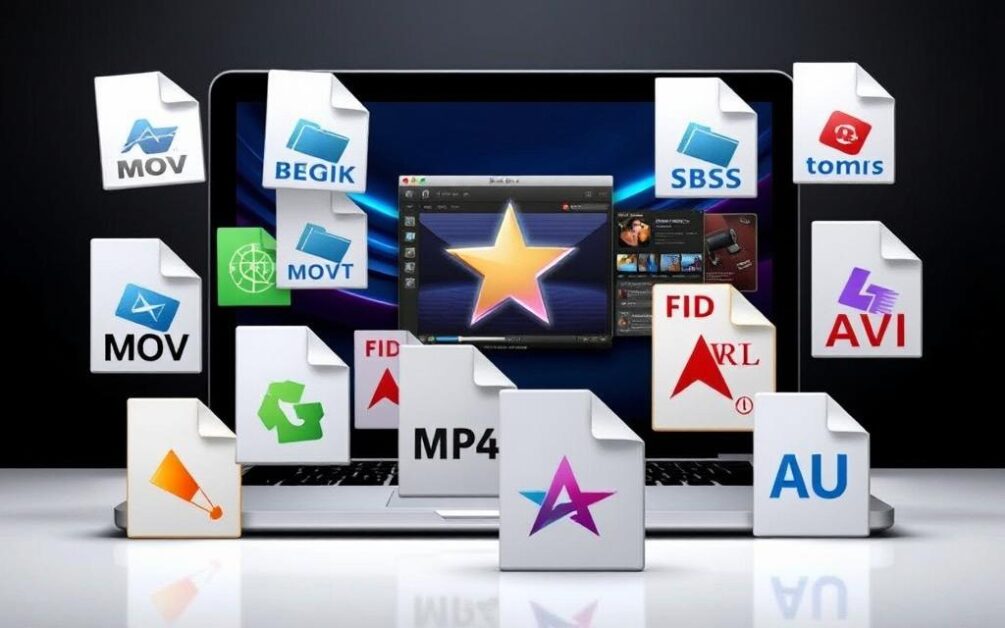Discover the accaptable files on mac imovie, imovie video formats, and imovie compatible file types for seamless video editing on your Apple device. iMovie, a popular video editing application designed by Apple for beginners, has limited support for certain imovie supported file extensions and imovie video codecs. This article covers the imovie import files, imovie media management, and imovie file requirements to ensure a smooth working with media in imovie experience.
Introduction to iMovie File Formats
When it comes to video editing with iMovie, understanding file formats is crucial. iMovie, Apple’s powerful video editing software, has specific requirements when it comes to the types of files it can work with. This section will explore the different video codecs and container formats supported by iMovie, as well as the importance of compatibility for a seamless editing experience.
Understanding Video Codecs and Container Formats
Video codecs are the compression algorithms used to encode and decode video data, while container formats like MP4, MOV, and AVI are the “wrappers” that hold the video and audio streams together. iMovie supports a range of imovie video formats, imovie compatible file types, and imovie supported file extensions, including H.264/AVC, HEVC, AVCHD, ProRes, MPEG-2, and MPEG-4.
The Importance of Compatibility in iMovie
Compatibility is crucial when using iMovie, as the application can only import and export files in certain imovie video codecs and compatibility in imovie formats. Knowing which formats iMovie supports, and how to convert incompatible media, is key to ensuring a seamless video editing workflow on your Mac.
For example, iMovie supports the widely used MP4 format with H.264 video and AAC audio, as well as the QuickTime MOV format with compatible codecs. However, it does not support some common video formats like WMV, AVI, FLV, and WebM.
By understanding the file format requirements of iMovie, you can ensure that your video and audio files are compatible, allowing you to take full advantage of the software’s powerful editing features and create professional-looking videos with ease.
accaptable files on mac imovie
If you’re a Mac user working with iMovie, it’s essential to understand the file types that are compatible with the video editing software. iMovie supports a range of video, audio, and image formats, ensuring a smooth and seamless editing experience. Some of the accaptable files on mac imovie include:
- Video formats: MP4, MOV, MPEG-2, AVCHD, DV, HDV, MPEG-4, and H.264
- Audio formats: MP3, WAV, M4A, AIFF, and AAC
To ensure your media files are imovie compatible file types, you can use tools like Faasoft iMovie Converter or Movavi Video Converter to convert various video formats to the imovie supported file extensions supported by the software. These tools allow you to make the necessary adjustments, such as adding subtitles, applying effects, or even trimming your videos, before importing them into iMovie.
It’s important to note that while iMovie supports a wide range of file formats, it does not work with some less common video formats like MKV, WMV, VOB, and FLV. If you have files in these unsupported formats, you’ll need to convert them to a compatible format before importing them into your iMovie projects.
By understanding the accaptable files on mac imovie, you can ensure a seamless video editing experience on your Mac, allowing you to bring your creative visions to life with ease.
iMovie Compatible Video Formats for Importing
When it comes to video editing with iMovie on your Mac, understanding the supported file formats is crucial for a seamless experience. Fortunately, iMovie is designed to work with a wide range of video codecs and container formats, making it easy to import footage from various sources.
Supported Video Codecs and Container Formats
iMovie can handle a variety of video formats, including popular options like H.264, HEVC (High-Efficiency Video Coding), ProRes, MPEG-2, and MPEG-4. The supported container formats include MOV, MP4, 3GP, and AVI, as long as they contain compatible codecs.
This versatility allows users to import video files from a wide range of digital cameras, camcorders, and other sources, ensuring a smooth transition into the iMovie editing environment. Understanding the specific video codecs and container formats that iMovie supports is essential for a successful import process and a seamless video editing experience.
| Video Formats | Audio Formats |
|---|---|
|
|
By understanding the iMovie video formats, iMovie compatible file types, and iMovie supported file extensions, users can ensure a seamless iMovie import files process and take full advantage of the powerful video editing capabilities offered by iMovie on their Mac.

“Staying compatible with the latest video and audio formats is essential for a modern video editing experience.”
Unsupported Video Formats in iMovie
While iMovie is a powerful video editing software, it doesn’t support every video format out there. Some of the imovie unsupported file formats include WMV (Windows Media Video), AVI (Audio Video Interleave), FLV (Flash Video), MKV (Matroska), VOB (Video Object), and WebM. If you try to import these imovie incompatible video formats into your projects, you may encounter compatibility issues or be unable to import the files altogether.
To use these unsupported video formats in iMovie, you’ll need to convert them to a compatible format first. Supported video codecs and container formats for iMovie include DV, HDV, AVCHD, MP4, and MOV files. The full-featured Pavtube Video Converter for Mac can help you easily convert a wide range of video formats to those supported by iMovie, ensuring a smooth editing experience.
| Unsupported Video Formats | Supported Video Formats |
|---|---|
| WMV, AVI, FLV, MKV, VOB, WebM | DV, HDV, AVCHD, MP4, MOV |
If you’re having trouble with video formats not supported by imovie, consider using a reliable video converter like Pavtube Video Converter for Mac. This software can handle over 250+ video and audio formats, allowing you to easily convert your files to the correct iMovie-compatible formats.
By keeping your video files in the right format, you can ensure a seamless editing experience with iMovie and avoid any compatibility issues. Remember, taking the time to convert your videos can save you a lot of frustration down the line.
Audio Formats Supported by iMovie
In addition to a wide range of video formats, iMovie also supports a variety of audio file types for importing and using in your projects. The supported audio formats include MP3, AAC, WAV, AIFF, and M4A. This versatility allows you to effortlessly incorporate audio elements into your iMovie videos, whether you’re using them as background music, voiceovers, or sound effects.
Importing Audio Files into iMovie Projects
Integrating audio files into your iMovie projects is a straightforward process. iMovie provides you with several options to access and import your desired audio files, including the Soundtracks, My Music, and Songs in iCloud features. This enables you to seamlessly mix and match different audio elements to create a polished, professional-sounding video.
| Audio Format | File Extension | Compression Type | Bit Depth | Sample Rate |
|---|---|---|---|---|
| MP3 | .mp3 | Lossy | 16-bit | 44.1 kHz |
| AAC | .m4a | Lossy | 16-bit | 44.1 kHz |
| WAV | .wav | Lossless | 16-bit, 24-bit | 44.1 kHz, 48 kHz |
| AIFF | .aiff | Lossless | 16-bit, 24-bit | 44.1 kHz, 48 kHz |
| M4A | .m4a | Lossy | 16-bit | 44.1 kHz |
Understanding the audio formats supported by iMovie is essential for creating well-rounded, professional-looking videos on your Mac. By leveraging the flexibility of these audio file types, you can enhance the overall quality and impact of your video projects.
Conclusion
In conclusion, understanding the file format compatibility of iMovie is crucial for ensuring a smooth and successful video editing experience on your Mac. By knowing the supported video, audio, and image formats, as well as how to handle incompatible media, you can import and work with a wide variety of content in your iMovie projects. Whether you’re a seasoned video editor or a beginner, mastering iMovie’s file format requirements will empower you to create high-quality, polished videos that can be easily shared and enjoyed.
Staying informed about iMovie file format compatibility, iMovie media management, and effectively working with files in iMovie will allow you to take full advantage of this powerful video editing tool. With the right knowledge and techniques, you can seamlessly import, edit, and export your media, ensuring your final product meets your desired quality and file size specifications, whether it’s for online platforms like YouTube or personal use.
By following best practices for managing files in iMovie, you’ll be able to streamline your video editing workflow and achieve the high-quality results you envision. Embrace the flexibility and versatility of iMovie’s file format support to unlock new creative possibilities and bring your video projects to life with ease.





